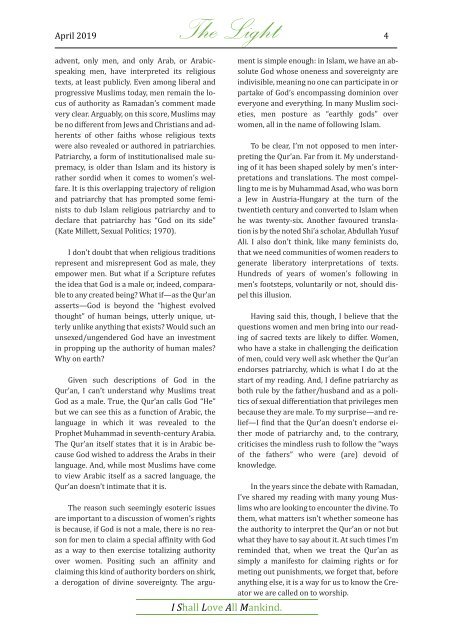The Light April 2019 04
Monthly magazine of the Ahmadiyya Association for the Propagation of Islam. Propagating Islam as taught by the Holy Prophet Muhammad (s) - peaceful, loving, inclusive and rational which teaches respect for the followers and founders of all religions.
Monthly magazine of the Ahmadiyya Association for the Propagation of Islam. Propagating Islam as taught by the Holy Prophet Muhammad (s) - peaceful, loving, inclusive and rational which teaches respect for the followers and founders of all religions.
Create successful ePaper yourself
Turn your PDF publications into a flip-book with our unique Google optimized e-Paper software.
<strong>April</strong> <strong>2019</strong> <strong>The</strong><br />
<strong>Light</strong> 4<br />
advent, only men, and only Arab, or Arabicspeaking<br />
men, have interpreted its religious<br />
texts, at least publicly. Even among liberal and<br />
progressive Muslims today, men remain the locus<br />
of authority as Ramadan’s comment made<br />
very clear. Arguably, on this score, Muslims may<br />
be no different from Jews and Christians and adherents<br />
of other faiths whose religious texts<br />
were also revealed or authored in patriarchies.<br />
Patriarchy, a form of institutionalised male supremacy,<br />
is older than Islam and its history is<br />
rather sordid when it comes to women’s welfare.<br />
It is this overlapping trajectory of religion<br />
and patriarchy that has prompted some feminists<br />
to dub Islam religious patriarchy and to<br />
declare that patriarchy has “God on its side”<br />
(Kate Millett, Sexual Politics; 1970).<br />
I don’t doubt that when religious traditions<br />
represent and misrepresent God as male, they<br />
empower men. But what if a Scripture refutes<br />
the idea that God is a male or, indeed, comparable<br />
to any created being? What if—as the Qur’an<br />
asserts—God is beyond the “highest evolved<br />
thought” of human beings, utterly unique, utterly<br />
unlike anything that exists? Would such an<br />
unsexed/ungendered God have an investment<br />
in propping up the authority of human males?<br />
Why on earth?<br />
Given such descriptions of God in the<br />
Qur’an, I can’t understand why Muslims treat<br />
God as a male. True, the Qur’an calls God “He”<br />
but we can see this as a function of Arabic, the<br />
language in which it was revealed to the<br />
Prophet Muhammad in seventh-century Arabia.<br />
<strong>The</strong> Qur’an itself states that it is in Arabic because<br />
God wished to address the Arabs in their<br />
language. And, while most Muslims have come<br />
to view Arabic itself as a sacred language, the<br />
Qur’an doesn’t intimate that it is.<br />
I Shall Love All Mankind.<br />
<strong>The</strong> reason such seemingly esoteric issues<br />
are important to a discussion of women’s rights<br />
is because, if God is not a male, there is no reason<br />
for men to claim a special affinity with God<br />
as a way to then exercise totalizing authority<br />
over women. Positing such an affinity and<br />
claiming this kind of authority borders on shirk,<br />
a derogation of divine sovereignty. <strong>The</strong> argument<br />
is simple enough: in Islam, we have an absolute<br />
God whose oneness and sovereignty are<br />
indivisible, meaning no one can participate in or<br />
partake of God’s encompassing dominion over<br />
everyone and everything. In many Muslim societies,<br />
men posture as “earthly gods” over<br />
women, all in the name of following Islam.<br />
To be clear, I’m not opposed to men interpreting<br />
the Qur’an. Far from it. My understanding<br />
of it has been shaped solely by men’s interpretations<br />
and translations. <strong>The</strong> most compelling<br />
to me is by Muhammad Asad, who was born<br />
a Jew in Austria-Hungary at the turn of the<br />
twentieth century and converted to Islam when<br />
he was twenty-six. Another favoured translation<br />
is by the noted Shi’a scholar, Abdullah Yusuf<br />
Ali. I also don’t think, like many feminists do,<br />
that we need communities of women readers to<br />
generate liberatory interpretations of texts.<br />
Hundreds of years of women’s following in<br />
men’s footsteps, voluntarily or not, should dispel<br />
this illusion.<br />
Having said this, though, I believe that the<br />
questions women and men bring into our reading<br />
of sacred texts are likely to differ. Women,<br />
who have a stake in challenging the deification<br />
of men, could very well ask whether the Qur’an<br />
endorses patriarchy, which is what I do at the<br />
start of my reading. And, I define patriarchy as<br />
both rule by the father/husband and as a politics<br />
of sexual differentiation that privileges men<br />
because they are male. To my surprise—and relief—I<br />
find that the Qur’an doesn’t endorse either<br />
mode of patriarchy and, to the contrary,<br />
criticises the mindless rush to follow the “ways<br />
of the fathers” who were (are) devoid of<br />
knowledge.<br />
In the years since the debate with Ramadan,<br />
I’ve shared my reading with many young Muslims<br />
who are looking to encounter the divine. To<br />
them, what matters isn’t whether someone has<br />
the authority to interpret the Qur’an or not but<br />
what they have to say about it. At such times I’m<br />
reminded that, when we treat the Qur’an as<br />
simply a manifesto for claiming rights or for<br />
meting out punishments, we forget that, before<br />
anything else, it is a way for us to know the Creator<br />
we are called on to worship.














